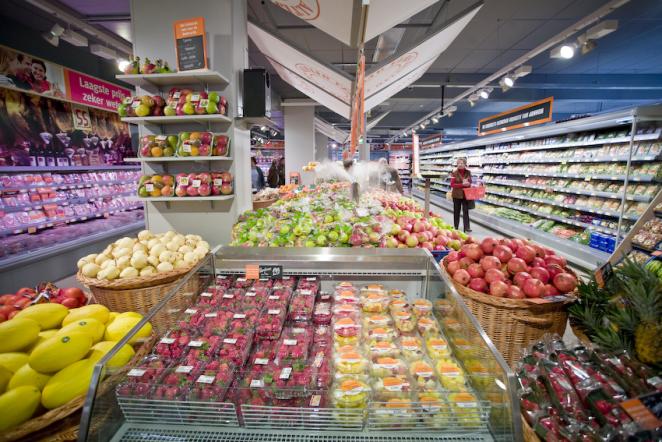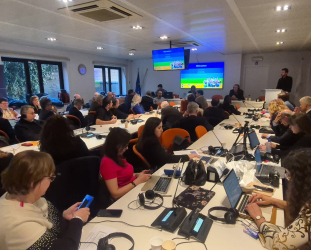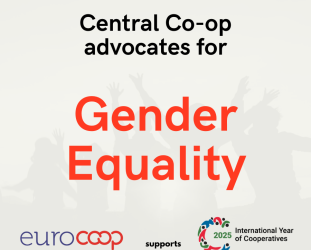Euro Coop response to the Green Paper on Unfair Trading Practices in the Business-to-Business Food and Non-Food Supply Chain in Europe

30th April 2013
Euro Coop is the European Community of consumer co-operatives representing the interests of its members to the European institutions since 1957.
Euro Coop represents more than 4,500 local, regional and national consumer co-operative societies across 18 European countries. These are retail enterprises owned and democratically-managed by consumers which amount to more than 30 million across Europe. They are mainly active in food retail but cover other retail sectors as well.
Consumer co-operatives are values-based enterprises whose aim is not to maximise profits but rather to meet the needs and expectations of its members: consumers.
Co-operatives adhere to the International Co-operative Alliance statement on co-operative identity that sets the values and principles that guide their commercial undertakings. In this sense, co-operatives are ethical companies by nature.
The debate regarding fairness in the retail supply chain is therefore a core issue for consumer co-operatives which have extensive experience in translating ethical values into sound business operations.
Euro Coop has been actively involved in this debate and provides in this position paper its contribution to the continuation of such debate. Euro Coop takes note of the Green Paper on Unfair Trading Practices in the Business-to-Business Food and Non-Food Supply Chain in Europe (COM(2013) 37 final of 31.1.2013) – hereafter referred to as Green Paper – and provides below the responses to the questions it contains.
1) Do you agree with the above definition of UTPs?
Euro Coop believes that it is not useful or desirable to try to define Unfair Trading Practices (UTP). The Green Paper itself does not use a definition of UTP but rather attempts to illustrate situations where a trading practice could be considered fair or unfair. Only in the introduction the Green Paper mentions that “UTPs are practices that grossly deviate from good commercial conduct and are contrary to good faith and fair dealing”. But this definition is so general, so subjective and leaving so much room for interpretation that its eventual use in any context would only create uncertainty and insecurity for business operators.
The reason why it is not desirable to have a definition of UTP is the fact that the consideration of a trading practice as fair or unfair depends largely on the circumstances of each case. The qualifier “fair/unfair” is a value-based judgement that may vary considerably depending on the situation. No trading practice in itself is fair or unfair because it is the result of the freedom to contract by both parties.
To be able to determine the degree of fairness of a practice, a definition a priori is not needed. The best way to do this is to have a pre-defined set of values and principles that will allow to do this according to the circumstances of each case.
Another important thing to consider is that the pre-defined values and principles should be shared by all economic actors as a way of validating the value-judgement made under each case. In fact, the consideration of fairness is always subjective so unless you have a pre-defined and mutually agreed set of principles, there will always be different opinions on what is fair or unfair.
Finally, it is important that this set of principles is adhered to and applied voluntarily (see answer to question 15) because it is the only way to have a true change in the commercial culture of companies in cases where this does not happen yet.
This has been the approach taken by the EU level associations representing all the different interests in the food supply chain. All relevant stakeholders approved a set of principles of good practice in vertical relations in the food supply chain – hereafter referred to as the Principles – in November 2011. And the majority of these stakeholders also approved a voluntary framework for their implementation and enforcement in January 2013 – hereafter referred to as the Framework. Euro Coop considers that this approach is the correct one and should be given a fair chance to demonstrate its success. Therefore no definition of UTP is needed.
2) Is the concept of UTPs recognised in your Member State? If yes, please explain how.
Euro Coop is an EU level association and therefore this question is not applicable to it.
3) In your view, should the concept of UTPs be limited to contractual negotiations or should they include the pre- and/or the post-contractual phase as well?
Euro Coop considers that the issue of UTP should be dealt with by a pre-defined set of principles of good practices. In this sense, it is not relevant the distinction between pre- and/or post- contractual phases. The mutually agreed principles will look at the situations that need to be addressed independently of this qualification.
4) At what stage in the B2B retail supply chain can UTPs occur?
UTP can occur at any stage of the supply chain. This has been recognised by all the stakeholders and is reflected by the Principles agreed in November 2011.
It is important to recognise that all actors in the chain should apply the same principles and be subject to the same set of obligations. This is the only way to achieve a balanced situation that is the underlying condition to build trust and ultimately a well-functioning chain.
5) What do you think of the concept of "fear factor"? Do you share the assessment made above on this issue? Please explain.
The concept of “fear factor” has several implications in the discussion regarding trading practices. It is a subjective element that despite being justified or not, needs to be taken into consideration.
Like most “fears”, the fear of commercial retaliation can be largely irrational and unjustified.
Frequently when there is a sensitive issue being discussed at political level with large public and media attention, these emotional factors are present in the discussions and need to be taken into consideration. However, these factors need also to be put into perspective.
Every day there are thousands of commercial transactions taking place between different economic operators. The vast majority of these operations happen without any problems. When problems exist, in the majority of cases, they are settled without even reaching a stage of being considered a conflict or a dispute (e.g. through commercial renegotiation). When disputes do exist, they are handled in different ways, from commercial systems within the companies to the traditional judicial systems and in many cases the disputes are settled to the satisfaction of both parties.
Therefore, Euro Coop considers that the situations when an operator has allegedly been target of an UTP and does not complain due to a “fear factor” are exceptions to the rule and cannot be considered as the general case.
Nevertheless, if that fear exists it has to be addressed and as the Green Paper states this would be in particular during the enforcement stage.
Euro Coop considers that the “fear factor” can only be adequately addressed through the building of trust between economic operators. That can be achieved by creating an environment where introducing, managing and solving disputes is considered normal business behaviour. To do this, the best way is a voluntary system that allows for a certain protection of the “fearful” party without putting into question the right of defence of the accused party.
The voluntary Framework agreed by several EU level organisations is an adequate tool to do that because it combines elements of anonymity and confidentiality while keeping a trust-based approach.
Other possibilities identified in the Green Paper are not efficient in dealing with a “fear factor” either because they escalate the disputes from a value-judgement approach to a legal level (see answer to question 15) or because they may create an environment of suspicion and mistrust that will only lead to the opposite result (see answer to question 18).
In conclusion, Euro Coop considers that the voluntary initiative in place with the Principles and the Framework will help create a cultural change towards dispute resolution and, by that, contribute to the reduction and elimination of the “fear factor”. For these reasons, among others, that system must be given a fair chance to demonstrate its results.
6) In your experience, to what extent and how often do UTPs occur in the food sector? At which stage of the commercial relationship do they mainly occur and in what way?
Euro Coop considers that UTP are the exception to the rule (see answer to question 5) and must be addressed as such. They can occur at any stage of the supply chain (see answer to question 4).
7) Are UTPs present in non-food retail sectors as well? If so, please provide concrete examples.
Euro Coop considers that there are no fundamental differences between the food and non-food sectors (as defined by the Green Paper) and therefore the exceptional nature of UTP and the way they should be addressed does not vary between the two.
It should be noted that in the Framework agreed by several EU level organisations, it is specifically mentioned that “companies who are part of the food and drink chain are encouraged to apply the principles throughout their organisations independently of the nature of the product if similar conditions exist (e.g. similar chain composition; similar product groups or similar procurement policies)”.
It should be noted as well that the agreement on the Principles and the Framework was done under the framework of the High Level Forum for a Better Functioning Food Supply Chain and therefore the participating stakeholders where from the food supply chain. Euro Coop considers that any extension of the scope of the voluntary initiative to the non-food sector must be preceded by the involvement of any relevant stakeholders in that sector that have not participated in the discussions. This would guarantee a consensual approach as in the food sector. As mentioned before, this mutually agreed set of principles will be more effective if there is a sense of co-ownership by everyone involved.
8) Do UTPs have an adverse impact in particular as regards the ability of your company to invest and innovate? Please provide concrete examples and quantify to the extent possible.
Euro Coop is an EU level association and therefore cannot provide a direct answer to this question. However, UTP have never been indicated by any of our members as having any type of impact in the ability to invest or innovate.
9) Do UTPs affect consumers (e.g., through influencing prices, product choice or innovation)? Please provide concrete examples and quantify to the extent possible.
As enterprises owned and democratically controlled by consumers, consumer co-operatives pay a particular attention to the promotion and safeguard of consumer interests.
As mentioned before, Euro Coop considers that UTP are an exception and do not reflect the vast majority of the transactions in the market. Therefore, any potential effects on consumers will be marginal.
Nevertheless, when unfair practices do occur they will obviously have a reflection on consumers as the operator resorting to such practices may gain an unjustified competitive advantage distorting the market which may eventually lead to less choice and diversity in the market contrary to consumer expectations.
The distortion of completion and the negative impact on consumers, even if marginal, are reasons to take action and try to minimise and eliminate UTP. However, over-regulating may have the opposite effect, i.e. imposing more costs on companies, reducing the flexibility in the market and increasing legal insecurity will certainly have negative effects on consumers, first and foremost on prices (see answer to question 25).
Any solution to deal with UTP must be proportionate to the real effect they have on the market and consumer interests cannot be a “scapegoat” to justify actions that will lead to the opposite result of putting in question those interests.
10) Do UTPs have an impact on EU cross-border trade? Do UTPs result in a fragmentation of the Single Market? If yes, please explain to what extent UTPs impact the ability of your company to trade cross-border.
Euro Coop considers that UTP, when they exist, do not have an effect on cross-border trade and do not cause fragmentation of the Single Market. Cross-border trade barriers are well documented and they relate to certain legal requirements, different cultures, language barriers, etc.
Even if theoretically the point could be made that UTP have an impact on cross-border trade, this impact would be so marginal and negligible that would not justify any EU level action considering the principle of proportionality.
11) Do the national regulatory/self-regulatory frameworks in place sufficiently address UTPs in some Member States? If not, why?
Euro Coop is an EU level association and therefore does not have the expertise for a thorough assessment of different national frameworks.
Nevertheless, Euro Coop considers that solutions for eventual UTP must be found, first of all, at national level. Food retail is a national or even local business; negotiation cultures vary from country to country; dispute settlements are linked to different judicial and legal environments, etc.
This was an argument that was supported by all the organisations that negotiated and approved the Principles of good practice. This was also the reason why the Framework for their implementation foresees the creation of national platforms and clearly states that “the national level is the most appropriate to deal with disputes and to govern the system”.
Independently of whether or not current frameworks provide an adequate response to the issue of UTP, the solutions to improve, change, create or eliminate them must be taken at national level. An EU intervention would be disproportionate to the nature and size of the problem and against the principles of proportionality and subsidiarity.
12) Is the lack of specific national regulatory/self-regulatory frameworks addressing UTPs a problem in jurisdictions where they do not exist?
See answer to question 11.
13) Do measures that seek to address UTPs have effects only on domestic markets or also on cross-border trade/provision of services? If so, please explain the impact on the ability of your company to trade cross-border. Do the differences between national regulatory/self-regulatory frameworks in place result in fragmentation of the Single Market?
Euro Coop considers that UTP and/or their implementation frameworks do not have an impact on cross-border trade and even if they did, it would be so small and negligible that it would not justify any EU action.
14) Do you consider further action should be taken at EU level?
No.
As illustrated in this position paper, an EU action on this topic would be disproportionate and unjustified in terms of subsidiarity.
UTP are an exception, they are not the rule in commercial relations. When they exist they should be solved through national measures that are more in line with the different commercial and legal cultures of Member States. UTP do not have an impact on cross-border trade and do not cause fragmentation of the Single Market. For all these reasons it would be difficult to justify EU action on this topic.
Additionally Euro Coop considers that a solution for UTP should have a voluntary nature and not a public administrative or legislative nature (see answer to question 15).
What the EU institutions could do, in particular the European Commission, would be to actively support the Framework for the implementation of the Principles and encourage all stakeholders to participate and make it work properly.
15) Where it exists, does UTP regulation have a positive impact? Are there possible drawbacks/concerns linked to introducing UTP regulation, for example by imposing unjustified restrictions to contractual freedom? Please explain.
The introduction of regulation in any area will always have some costs and some benefits. However, before doing such analysis it is important to question if the introduction of regulation is fit to purpose in the sense of knowing if it is an adequate tool to achieve the public policy objectives intended.
In the specific case of UTP, Euro Coop considers that the introduction of regulation at EU level at this moment is not the best option.
The value judgement of fair or unfair regarding a trading practice is an ethical judgement. The introduction of regulation changes the paradigm to a legal/illegal plan. Doing so reduces the flexibility for companies to negotiate terms and conditions because there are greater restrictions to their contractual freedom.
Introducing regulation also has a negative impact in terms of costs not only for companies but also public authorities. For companies, regulation normally involves greater administrative burden and greater obligations that will reflect in greater costs. For public authorities the introduction of regulation must be accompanied by the necessary set-up of public enforcement mechanisms. In fact, it cannot be expected of private economic operators the assumption of the costs of implementing public regulation. Naturally, introducing more costs into the supply chain will have negative economic repercussions. These additional costs will have to be transmitted within the chain itself (e.g. lower margins for all operators) or by increasing prices to consumers.
In a time of deep economic crises with large restrictions to public budgets and, more importantly, with reducing purchasing power of consumers, the introduction of such costs is largely disproportionate to the eventual benefits and therefore not justifiable economically.
Another drawback of regulation, especially at EU level is the amount of time it takes to get it approved and implemented in all EU Member States. This fact, combined with the time it usually takes if a revision or modification of such regulation is necessary, gives little flexibility for regulation to adapt to the real circumstances in the market.
Regulating will also not help changing the culture of economic operators that may resort to UTP. On the contrary, it may have an opposite result as it may create a climate of confrontation and mistrust.
The voluntary Framework for implementation of the Principles of good practice agreed by the stakeholders provides a more flexible, quicker, proportionate and cost-effective way of dealing with the issue of UTP and therefore a chance must be given to it to show results. If the voluntary initiative proves effective it can be easily adapted and developed and, in any case, it will not preclude the right of public authorities to introduce other types of regulation either at national or EU level. On the contrary, the introduction of regulation at this moment, would constitute a definitive measure that would not allow any way back to a voluntary system.
16) Are there significant discrepancies in the legal treatment of UTPs between Member States? If this is the case, are these discrepancies hindering cross-border trade? Please provide concrete examples and quantify the impact to the extent possible.
Euro Coop considers that, as with the substantive regulation of UTP, the enforcement frameworks do not have an impact on cross-border trade (see answer to question 10).
17) In case of such negative impacts to what extent should a common EU approach to enforcement address the issue?
Euro Coop considers that an EU approach to enforcement is not justifiable given the lack of impact on cross-border trade or in the fragmentation of the Single Market. EU action in this field would be disproportionate and contrary to the principle of subsidiarity (see answers to questions 10, 14 and 15).
18) Should the relevant enforcement bodies be granted investigative powers, including the right to launch ex officio actions, impose sanctions and to accept anonymous complaints?
Enforcement mechanisms, whether voluntary or regulatory (national), should contain some elements of confidentiality, anonymity and sanctions. However, these elements should be designed in a balanced way to offer all the parties a guarantee of transparency, objectivity, impartiality and proportionality. Putting too much emphasis on the grieving party can lead to a climate of suspicion and distrust that ultimately will not achieve the intended goals.
Regarding the elements of “investigative powers” and “ex officio” actions, this only would eventually make sense in a regulatory framework because such kind of police-like powers can only be given to a public authority trough a legislative measure. As mentioned before, Euro Coop does not consider a regulatory measure to be the best option. But even if it was, Euro Coop believes that these kind of powers should be avoided because they create an environment of suspicion and resentment instead of trust. Furthermore, they have disproportionate costs for companies and public authorities (see answer to question 15).
The voluntary imitative contains elements such as sanctions, confidentiality and anonymity. Euro Coop believes that these elements have been developed in a balanced way and therefore it is another reason for its implementation and for the support of EU institutions.
19) Does the above list detail the most significant UTPs? Are there other types of UTPs?
In Euro Coop’s view, the Green Paper does not use the correct methodology to tackle this issue. There should not be a “list” of UTP but rather principles of good practice. The reason is that the qualification of a trading practice as fair or unfair will depend on the circumstances of each case.
In fact, it is incorrect and undesirable to say, for example, that the “lack of written contracts” is unfair. It depends. It is not the trading practice itself that is fair or unfair but rather the conduct under the circumstances. The same exact practice can be fair under one circumstance and unfair in another.
Therefore to “list” unfair practices is not methodologically correct in Euro Coop’s opinion.
This is the reason why the Principles of good practice approved by all relevant stakeholders in the food chain are elaborated as such: as principles. The “fair/unfair” qualification only appears in a list of examples, i.e. depending on the circumstances.
As far as the situations identified in the Green Paper are concerned, they correspond to the ones identified by all the stakeholders that approved the Principles of good practice and are reflected in those. The only exception is the question of territorial supply constraints which, in Euro Coop’s view, should not be treated as a question of fair or unfair trading practice but rather as a question of infringement of Single Market rules (see answer to question 22).
20) Could setting up a list of prohibited UTPs be an effective means to address the issue? Would such a list have to be regularly updated? Are there possible alternative solutions?
Euro Coop does not agree with the methodology of establishing a list of UTP (see answer to question 19). The alternative solution is the definition of a commonly agreed set of principles of good practice as it has already been done by all relevant stakeholders in the food supply chain.
It is also important to note that a regulatory approach would offer far less flexibility in terms of updating and adapting those principles (see answer to question 15).
21) For each of the UTPs and corresponding possible fair practices identified above, please:
a. Indicate whether or not you agree the analysis of the Commission. If applicable, provide additional information.
The analysis provided in the Green Paper corresponds largely to the conclusions reflected in the Principles of good practice approved by stakeholders including Euro Coop. In that sense, Euro Coop agrees with it.
b. Explain whether the UTP is relevant for the sector in which you are active.
All identified situations are relevant for the sectors where consumer co-operatives are active.
c. Explain if the corresponding possible fair practice could be applied across the board in different sectors?
A priori Euro Coop does not see any reason why such practices cannot be applied to other sectors. However, given the necessary consensual approach that has been undertaken in the food sector for drafting the Principles, it would be important to involve all relevant stakeholders of other sectors before extending the same principles to them (see answer to question 7).
d. Explain if the UTP should be prohibited per se or if its assessment should be made on a case by-case basis.
The assessment should always be made in a case-by-case basis as explained before (see answer to questions 1 and 9).
22) As regards specifically Territorial Supply Constraints, please explain:
a. What would you consider to be objective efficiency grounds justifying a supplier not to supply a particular customer? Why?
b. What would be the advantages and disadvantages of prohibiting territorial supply constraints (as described above)? What practical effects would such a prohibition have on how companies set up their distribution systems in Europe?
Euro Coop considers that the issue of territorial supply constraints should be dealt separately to the other issues because it has a totally different nature. Territorial supply constraints should be treated under competition rules as they can create illegal trading barriers to the Single Market. Euro Coop calls on the Commission to open a separate discussion regarding territorial supply constraints outside the scope of UTP policies.
23) Should the above possible fair practices be embodied in a framework at EU level? Would there be any disadvantages to such an approach?
No. Euro Coop does not agree to an EU level regulatory mechanism on the issue of UTP. Examples of fair practices are already provided for in the Principles agreed by all relevant stakeholders in the food chain and therefore the EU should support and promote those Principles and corresponding enforcement mechanisms.
24) If you consider further action should be taken at EU level, should this be a binding legislative instrument? A non-binding? A self-regulatory initiative?
Euro Coop does not agree to an EU level regulatory mechanism on the issue of UTP. The EU should support and promote the Principles of good practice and corresponding enforcement mechanisms that have been agreed by the stakeholders (see also answers to questions 14 and 15).
25) This Green Paper addresses UTPs and fairness of B2B relationships in the B2B food and non-food supply chain. Do you think that any important issues have been omitted or under-represented in it?
Yes. As consumer-owned and controlled enterprises, consumer co-operatives consider that the interests of consumers are paramount in this discussion and yet they have not had the significance and importance that they should.
Consumers need and expect quality, safe, sustainable and affordable products. To be able to deliver this mix it is important that the supply chain functions properly in a fair but efficient way. Imposing regulatory measures that constraint freedom to negotiate or that create costs and burdens disproportionate to the scale of the problems that are being addressed will only cause negative impacts either to companies or to consumers. This should be a main consideration for the political decision and is, for Euro Coop, another reason why the voluntary initiatives already in place must be given a chance to prove if it can work because it is the solution that is quicker, more efficient, less costly and more flexible.
Euro Coop counts on the European Commission to make a serious impact assessment of the different policy options and is convinced that the cost/benefit analysis will clearly demonstrate that the voluntary initiative is the best way forward.
Latest News

Cooperatives Driving Change: Key Events in Brussels, March 2025
As part of the International Year of Cooperatives, a series of impactful events took place in...

EU Deregulation of New GMOs: A Blow to Consumer Rights and Transparency
EU Member States voted in favour of deregulating new genetic techniques (NGTs) , exempting...

Join us at the EESC for the "Driving sustainability through healthy diets" Conference
Euro Coop is pleased to invite you to the "Driving sustainability through healthy...
Latest Stories

Coop Private Label Products Shine at the 2025 European Private Label Awards
The 2025 European Private Label Awards have celebrated the achievements in store brand...

Empowering Consumers for a Sustainable Future: An Interview with HISPACOOP for World Consumer Day
On the occasion of World Consumer Day, we highlight the essential role of consumer...

Celebrating Women in Leadership: Debbie Robinson and Central Co-op’s Commitment to Gender Equality
As we mark International Women’s Day, Euro Coop proudly highlights the invaluable...

